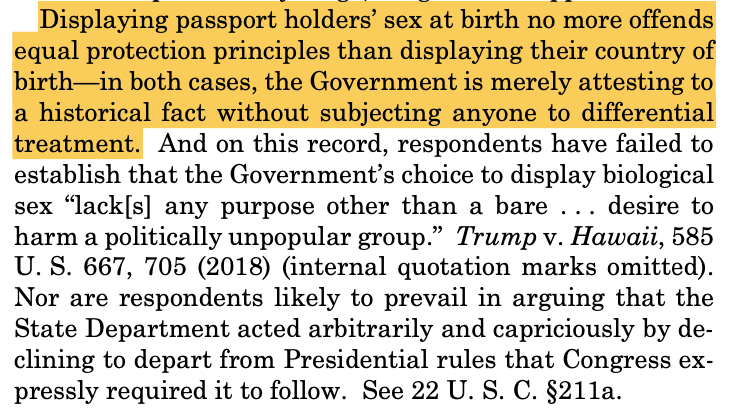SCOTUS lets Trump administration implement anti-trans, anti-nonbinary passport policy
The Democratic appointees, led by Justice Ketanji Brown Jackson, dissented. The ruling, which applies during litigation, effectively reverses two lower court rulings.
In an unsigned, abusive order on Thursday, the U.S. Supreme Court’s Republican appointees allowed the Trump administration to implement its anti-transgender, anti-nonbinary passport policy — requiring passports to display a person’s “biological sex” — during litigation.
Thursday’s order, Justice Ketanji Brown Jackson wrote in dissent for the Democratic appointees, is “part of a broader pattern of this Court using its emergency docket to cavalierly pick the winners and losers in cases that are still pending in the lower courts.“
The four-paragraph order from the majority effectively reverses the district court’s classwide injunction in the case, Orr v. Trump, as well as the decision from the U.S. Court of Appeals for the First Circuit denying the Justice Department’s request for a stay pending appeal, while the case proceeds.
Jackson, joined by Justices Sonia Sotomayor and Elena Kagan, called out the majority in her dissent for its failings on two fronts.
Jackson highlighted the improper way the majority is applying fundamental court rules for issuing equitable relief — when judges should issue injunctions, stays, or other relief like Thursday’s order — across the board on the shadow docket. More importantly, Jackson also described the substantive effect — the harm — of Thursday’s decision on transgender and nonbinary people.
“Because I cannot acquiesce to this pointless but painful perversion of our equitable discretion, I respectfully dissent,“ Jackson wrote.
Thursday’s “perversion,” as Jackson put it, could have extremely detrimental, even dangerous, effects on transgender and nonbinary people who need — or recently obtained — passports that accurately reflect their gender identity.
Law Dork will have more on the fallout from Thursday’s order — including the State Department’s next steps — as information becomes available.
Allowing passports with a person’s accurate gender identity is not new. Since 1992, as Jackson detailed, the U.S. government has, under different standards over time, allowed people “to obtain U.S. passports with sex markers that match their gender identity.“ Yes, that includes during the first Trump administration.
With the second Trump administration, however, the State Department — following President Donald Trump’s January 20 executive order on “biological sex” — issued new, “biological sex” requirements for passports.
Cases, including the classwide injunction at issue here, followed, with the policy being blocked in two different courts — due to the strength of the legal case made by the trans and nonbinary plaintiffs and the harm they showed they would face if Secretary of State Marco Rubio and the State Department were allowed to enforce the policy.
And yet, on Thursday, at least five of the six Republican appointees on the court — none of the six wrote anything, or stated their vote publicly — rejected all of that in an appallingly dismissive, horrifyingly abrupt order.
Addressing the first stay factor — the likelihood of success on the merits — the Supreme Court stated, “Displaying passport holders’ sex at birth no more offends equal protection principles than displaying their country of birth—in both cases, the Government is merely attesting to a historical fact without subjecting anyone to differential treatment.“
It is an abusive sentence, ignoring the purpose of equal protection guarantees, the evidence presented in the case, and the very existence of trans and nonbinary people.
The unsigned Supreme Court order continued:
With that, the stay pending appeal was granted — allowing the State Department to implement its policy.
As Jackson explained, this is not at all how it is supposed to work. And, in this case, it was done to a discriminatory end.
Most importantly, the court literally ignored trans and nonbinary people entirely in its order.
“The Court … fails to spill any ink considering the plaintiffs, opting instead to intervene in the Government’s favor without equitable justification, and in a manner that permits harm to be inflicted on the most vulnerable party,“ Jackson explained.
What is the harm? She explained:
Chief Justice John Roberts and Justices Clarence Thomas, Sam Alito, Neil Gorsuch, Brett Kavanaugh, and Amy Coney Barrett had nothing — not a word — to say about that when allowing the Trump administration to implement its policy.
Beyond that, Jackson explained, this is not a case in which equitable relief should even be possible — because the Trump administration “has failed to demonstrate any harm from the District Court’s injunction.”
Looking to the brief explanation provided by the majority, Jackson explained its insufficiency further. “[T]he Government’s asserted harm from being subjected to the injunction—its only asserted harm—is that the President cannot, at least for now, enact his preferred policies regarding sex markers on U. S. passports,” she wrote.
That is not a harm, Jackson continued. It is, rather, “just another species of the far-fetched contention that the President must be injured whenever he is prevented from doing as he wishes.“
Ultimately, Jackson concluded by pulling these two failings of the majority’s order together.
“In my view, the Court’s failure to acknowledge the basic norms of equity jurisdiction is more than merely regrettable,” she wrote. “It is an abdication of the Court’s duty to ensure that equitable standards apply equally to all litigants—to transgender people and the Government alike.”
But, on Thursday, as in August and many other times before and since on the shadow docket, the Supreme Court’s Republican appointees instead applied their “Calvinball jurisprudence with a twist,” as Jackson wrote then: “There are no fixed rules. We seem to have two: that one, and this Administration always wins.”
On Thursday, the administration won again. And, trans and nonbinary people — and all of those who care for the rule of law — lost.







This is horrible and exposes trans folk being outed at every turn. As a Canadian trans woman, I use my passport for more than simply crossing borders. My driver’s license and passport are often used at banking institutions, lawyers offices and government buildings to confirm my identity for reasons other than confirming my gender. Thus, in each circumstance I will be outed as trans even when this fact is not relevant to the particular situation. It’s demeaning and can cause undue embarrassment or possible danger if some psycho happens to see the documents. Further, I am quite sure Mr. Trump would not like to have his actual weight emblazoned on all of his identification documents.
And I totally agree with Justice Jackson — this shadow decision signals to lower courts its already-formed prejudices.